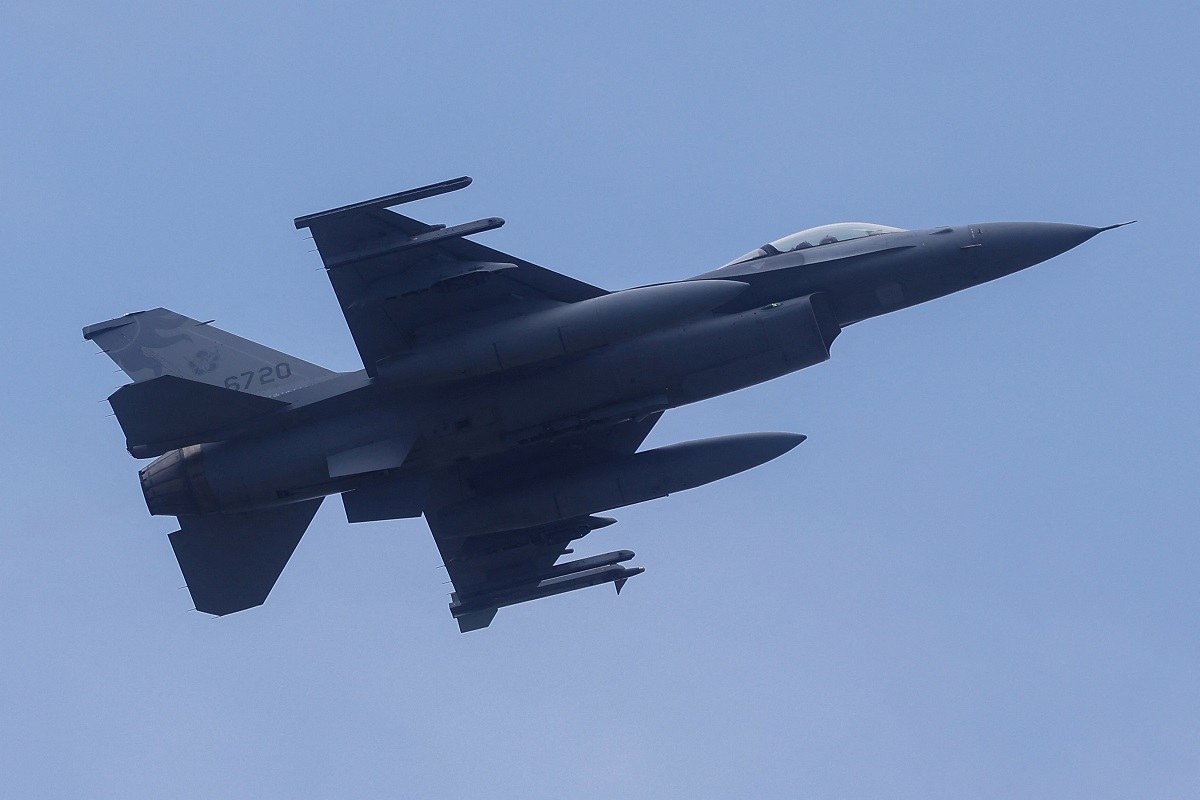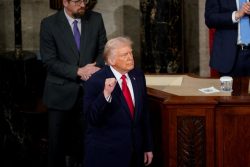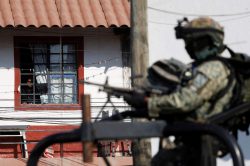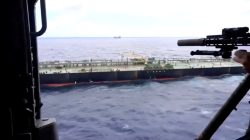
A Taiwan Air Force F-16 aircraft takes off in Hualien, Taiwan, on Sunday.
16:06 JST, April 9, 2023
TAIPEI (Reuters) — China’s military simulated precision strikes against Taiwan in a second day of drills around the island on Sunday, with the island’s defense ministry reporting multiple air force sorties and that it was monitoring China’s missile forces.
China, which claims democratically governed Taiwan as its own territory, began three days of military exercises around the island on Saturday, the day after Taiwan President Tsai Ing-wen returned from a brief visit to the United States.
Chinese state television reported that the combat readiness patrols and drills around Taiwan were continuing.
Under the unified command of the theater joint operations command center, multiple types of units carried out simulated joint precision strikes on key targets on Taiwan island and the surrounding sea areas, and continue to maintain an offensive posture around the island, it said.
A Taiwan security source told Reuters that on Saturday the Chinese drills around the Bashi Channel, which separates Taiwan from the Philippines, included simulated attacks on aircraft carrier groups as well as anti-submarine drills.
Taiwan’s defense ministry said that as of Sunday midday they had spotted 58 Chinese aircraft, including Su-30 fighters and H-6 bombers, as well as nine ships, around Taiwan.
The ministry said they were paying particular attention to the People’s Liberation Army’s Rocket Force which is in charge of China’s land-based missile system.
Regarding the movements of the Chinese communists’ Rocket Force, the nation’s military also has a close grasp through the joint intelligence, surveillance and reconnaissance system, and air defense forces remain on high alert, the ministry said.
It reiterated that Taiwan’s forces will “not escalate conflicts nor cause disputes” and would respond “appropriately” to China’s drills.
‘Comfortable, Confident’ U.S. monitors drills
Life in Taiwan has continued as normal, with no sign of panic or disruption from the Chinese drills.
Last August, following a visit to Taipei by Nancy Pelosi, then the speaker of the U.S. House of Representatives, China staged war games around Taiwan, including firing missiles into waters close to the island. It has not announced similar drills this time.
While in Los Angeles last week, on what was officially billed a transit on her way back from Central America, Tsai met the current speaker of the House, Kevin McCarthy, despite Beijing’s warnings against it.
The de facto U.S. embassy in Taiwan said on Sunday the United States was monitoring China’s drills around Taiwan closely and is “comfortable and confident” it has sufficient resources and capabilities regionally to ensure peace and stability.
U.S. channels of communication with China remain open and the United States had consistently urged restraint and no change to the status quo, said a spokesperson for the American Institute in Taiwan, which serves as an embassy in the absence of formal diplomatic ties.
Washington severed diplomatic relations with Taipei in favor of Beijing in 1979 but is bound by law to provide the island with the means to defend itself.
China, which has never renounced the use of force to bring the island under its control, says Taiwan is the most important and sensitive issue in its relations with the United States, and the topic is a frequent source of tensions.
Beijing considers Tsai a separatist and has rebuffed her repeated calls for talks. Tsai says only Taiwan’s people can decide their future.
Chinese fighters, warships
China has over the past three years or so stepped up its military pressure against Taiwan, flying regular missions around Taiwan, though not in its territorial air space or over the island itself.
Taiwan’s defense ministry said earlier on Sunday that in the previous 24 hours it had spotted 71 Chinese air force aircraft and nine navy vessels around Taiwan.
The ministry published a map showing around half of those aircraft, including Su-30s and J-11s, crossed the median line of the Taiwan Strait, which has for years served as an unofficial barrier between the two sides.
Chinese state media said the aircraft were armed with live weapons. Taiwanese air force jets also typically carry live weapons when they scramble to see off Chinese incursions.
Late on Saturday, Taiwan’s Ocean Affairs Council, which runs the Coast Guard, put out footage on its YouTube channel showing one of its ships shadowing a Chinese warship, though did not give an exact location.
You are seriously harming regional peace, stability and security. Please immediately turn around and leave. If you continue to proceed we will take expulsion measures, a Coast Guard officer says by radio to the Chinese ship.
Other footage showed a Taiwanese warship, the Di Hua, accompanying the Coast Guard ship in what the Coast Guard officer calls a “standoff” with the Chinese warship.
Still, civilian flights around Taiwan, including to Kinmen and Matsu, two groups of Taiwan-controlled islands right next to the Chinese coast, have continued as normal.
In August, civilian air traffic was disrupted after China announced effective no-fly zones in several blocks close to Taiwan where it was firing missiles.
Top Articles in News Services
-

Survey Shows False Election Info Perceived as True
-

Hong Kong Ex-Publisher Jimmy Lai’s Sentence Raises International Outcry as China Defends It
-

Japan’s Nikkei Stock Average Touches 58,000 as Yen, Jgbs Rally on Election Fallout (UPDATE 1)
-

Japan’s Nikkei Stock Average Falls as US-Iran Tensions Unsettle Investors (UPDATE 1)
-

Trump Names Former Federal Reserve Governor Warsh as the Next Fed Chair, Replacing Powell
JN ACCESS RANKING
-

Producer Behind Pop Group XG Arrested for Cocaine Possession
-

Japan PM Takaichi’s Cabinet Resigns en Masse
-

Man Infected with Measles Reportedly Dined at Restaurant in Tokyo Station
-

Israeli Ambassador to Japan Speaks about Japan’s Role in the Reconstruction of Gaza
-

Videos Plagiarized, Reposted with False Subtitles Claiming ‘Ryukyu Belongs to China’; Anti-China False Information Also Posted in Japan
























